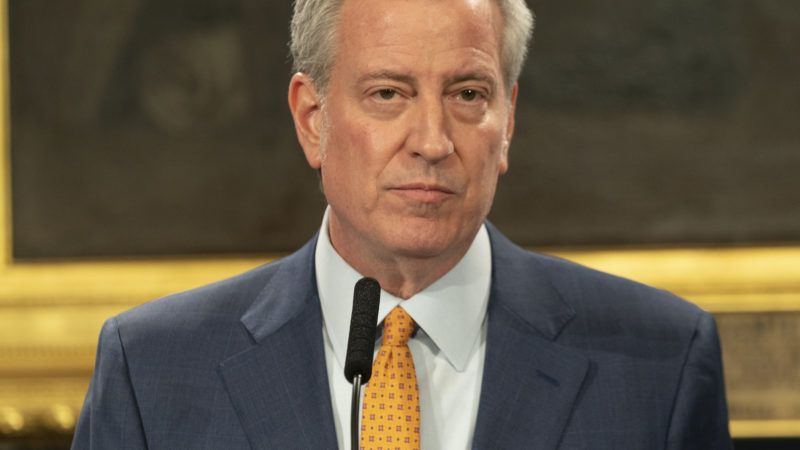Will the Next Eric Garner Be Killed Over Black Market Fireworks?
New York City Mayor Bill de Blasio is creating a task force to crackdown on the sale and use of illegal fireworks.

The past few years have seen many states and localities easing their restrictions on selling and using fireworks. Not so in New York City, where Mayor Bill de Blasio has just announced the creation of a new task force to enforce the city's unchanged ban on all consumer fireworks.
"Illegal fireworks are both dangerous and a public nuisance," said de Blasio today. "We're cracking down on this activity at the source to ensure the safety of all New Yorkers and the ability of our neighbors to get some sleep."
The 42-member task force will be comprised of officers from the New York Police Department's (NYPD) Intelligence Bureau, members of the city's Fire Department (FDNY), and members of the city's Sheriff's Bureau of Criminal Investigation. The latter agency is responsible for investigating city tax and financial crimes, including the trade in untaxed cigarettes.
The fireworks task force, according to a city press release, will "target suppliers, distributors and possessors of large quantities of illegal fireworks by conducting investigations and sting operations within and outside of New York City to disrupt supply chains." The FDNY will be responsible for running educational campaigns on the dangers of fireworks.
Currently, all consumer fireworks are illegal in New York City. That includes everything from M-80s to sparklers.
The creation of this task force comes amid a surge in complaints about firework use. City officials said at a press conference that the city received 1,737 complaints about illegal fireworks in June 2020, up from just 21 this time last year.
The added noise from those fireworks has spawned both demonstrations and conspiracy theories. Last night, a crowd of motorists honked their horns outside de Blasio's home to protest the constant disruptions to their sleep.
"Our message tonight was simple: Mr. Mayor, if we can't sleep, you won't sleep," tweeted City Councilmember Chaim Deutch, who attended the protest.
Our message tonight was simple: Mr. Mayor, if we can't sleep, you won't sleep. pic.twitter.com/7UuWnLfyrg
— Chaim Deutsch (@ChaimDeutsch) June 23, 2020
In a viral tweet thread, author Robert Jones Jr. speculated that the fireworks were being sold by government officials in an effort to desensitize minority communities to loud explosions and disrupt the Black Lives Matter movement.
There's no evidence for that theory. Others have suggested that the mass cancellation of Fourth of July celebrations has seen vendors selling off their stock of more-powerful commercial fireworks to regular consumers.
Julie Heckman of the American Pyrotechnics Association dismisses this theory out of hand, given the serious legal consequences that would come with selling professional fireworks to consumers.
"If [professional firework display companies] diverted them or tried to sell them to someone who's unlicensed, that is a felony, they would go to prison, and they would lose their license with [the Bureau of Alcohol, Tobacco, Firearms, and Explosives]," says Heckman. "No legitimate professional firework company is going to even entertain that idea."
Heckman says every video she's seen of fireworks popping off in New York City appears to be of the normal consumer variety. She theorizes that the spike in fireworks use is a result of lockdown orders that have left people inside with little to do for months now. What better way to blow off some steam than by blowing something up?
One licensed pyrotechnician interviewed by The Washington Post also threw cold water on the diversion theory, saying that commercial fireworks require special equipment to set off, and that consumer fireworks can be pretty loud all by themselves.
Creating a specialized police task force to crack down on consumer fireworks use raises a number of concerns.
Tensions between the NYPD and city residents are high right now after weeks of anti-police brutality protests and riots, which were often met with excessive force by the cops. Asking the police to step up their enforcement of yet another prohibition in this environment raises the potential for more citizen-police encounters to turn violent.
One of the worst examples of police violence in the city—the 2014 killing of Eric Garner—was committed by officers trying to crack down on the sale of black market cigarettes. That's an extreme example, to be sure, but also one to remember as the city embarks on a crackdown on black market fireworks.
The trend over the last few years has been for states and localities to ease their restrictions on consumer fireworks. This has coincided with a sharp increase in fireworks sales. Injuries related to fireworks have stayed pretty flat, however, hovering between 9,000 and 12,000 a year. That means the rate of fireworks injuries per million pounds sold has continued to fall.
Deaths related to fireworks are also mercifully rare. According to a 2019 government safety report, only five people died from fireworks-related injuries in 2018. That included a man who tried launching fireworks off of a football helmet he was wearing.
Heckman says that prohibitions on the use of fireworks in large cities remain commonplace, and make sense given the space constraints there. She says the American Pyrotechnic Association encourages everyone to know and follow their local fireworks regulations, and is therefore supportive of de Blasio's task force.
It's still important to remember that every government ban requires government force to maintain. The potential negative consequences of illegal fireworks use in a large, dense city like New York have to be weighed against the costs of enforcing the city's prohibition.
Given the NYPD's recent track record, it might be better to let people set off a few cherry bombs.
Rent Free is a weekly newsletter from Christian Britschgi on urbanism and the fight for less regulation, more housing, more property rights, and more freedom in America's cities.


Show Comments (136)